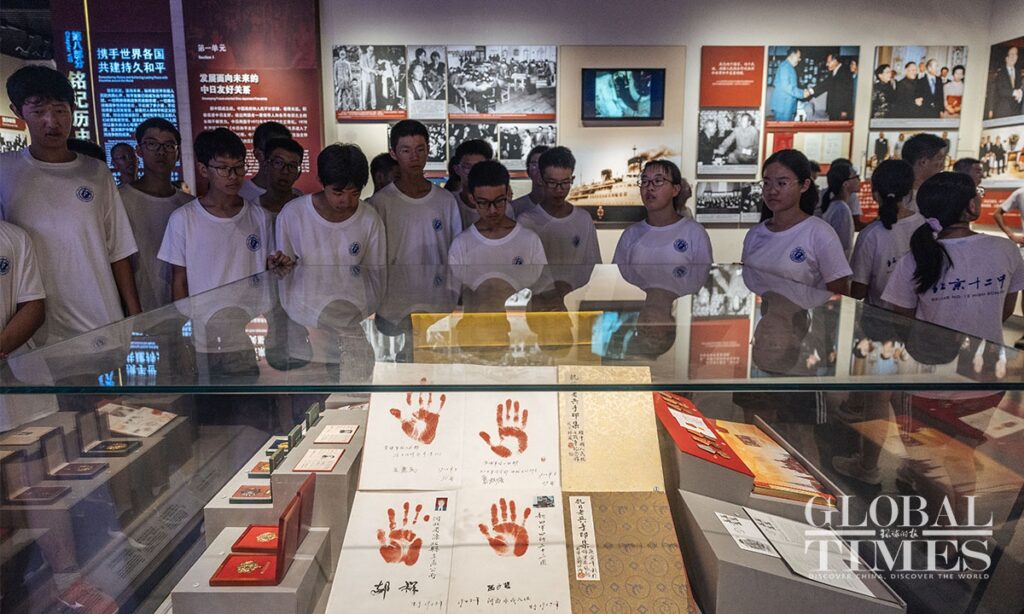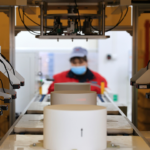China urged Japan to reflect genuinely on history and completely break from militarism through concrete actions, after Japanese Prime Minister Fumio Kishida sent a ritual offering to the notorious war-linked Yasukuni Shrine on Tuesday, an action that comes as China marks the 78th anniversary of Japan’s surrender in World War II.
Analysts said that with the resurgence of militarism, the Japanese right wing forces are trying to deny Japan’s crimes during World War II and overthrow the achievements of the world’s anti-fascist victory. Under the umbrella of the US, Japan has become a “bomb” in the Asia-Pacific, and regional countries should be on high alert for Japan’s military expansion ambitions.
Kishida on Tuesday sent an offering to the Yasukuni Shrine under his title as leader of the ruling Liberal Democratic Party (LDP), while economic security minister Sanae Takaichi, Kishida’s cabinet member, paid homage at the shrine, according to the Xinhua News Agency.
The Yasukuni Shrine honors 14 convicted Class-A Japanese war criminals from World War II. It has long been a source of diplomatic friction for Japan and its neighbors.
In response, Chinese Foreign Ministry Spokesperson Wang Wenbin said at a Tuesday press briefing that the negative moves of Japanese politicians concerning the Yasukuni Shrine once again reflect Japan’s incorrect attitude toward history and that China has lodged solemn representations with the Japanese side.
According to Wang, facing up to and deeply reflecting on the history of aggression is a necessary prerequisite for Japan to resume normal relations with its Asian neighbors after the war.
“China urges the Japanese side to earnestly learn lessons from history, stick to the path of peaceful development, take concrete actions to completely break with militarism and avoid further breaking its trust with its Asian neighbors and the international community,” the spokesperson said.
A spokesperson of the Chinese Embassy to Japan said on Tuesday that the Yasukuni Shrine is a spiritual tool and important symbol of Japanese militarism’s war of aggression. The essence of the Yasukuni Shrine issue is whether the Japanese government can correctly understand and deal with its history of aggression.
The relevant negative moves by the Japanese side once again prove that there is always a tendency in Japan to deny the crime of aggression, read the spokesperson statement.
It is worth mentioning that as Japan observed the 78th anniversary of its World War II defeat, Kishida did not mention the country’s wartime aggression in Asia or its victims in the region in his speech, AP reported.
A nationwide commemoration of the 78th anniversary was held in China on Tuesday. Memorials for the War of Resistance against Japanese Aggression (1931-45) across China held activities to look back on history and honor the country’s martyrs.
The September 18th Historical Museum in Shenyang, Northeast China’s Liaoning Province, on Tuesday exhibited more than 14,000 cultural relics, evidence of Japan’s brutal invasion that caused the deaths of 35 million Chinese people over 14 years.
In Nanjing, capital of Jiangsu Province, visitors struck the “Bell of Peace” and laid flowers at The Memorial Hall of the Victims in Nanjing Massacre by Japanese Invaders on Tuesday to mourn the 300,000 people who were killed in the Rape of Nanjing, one of the most barbaric episodes of World War II.
That same day, the Museum of the War of People’s Resistance Against Japanese Aggression in Beijing welcomed a group of 400 students from Beijing No.12 High School to participate in patriotic education activities and pay tribute to war martyrs.
China commemorates this day of victory over evil forces for the purpose of protecting the achievements of the anti-fascist victory, Lü Chao, the director of the Institute of US and East Asian Studies at Liaoning University, told the Global Times on Thursday.
In recent years, the proliferation of Japan’s militarism and its growing military buildup have been undermining the international order established since World War II, said Lü, noting that Asian countries must all remain highly vigilant.
Japan amended its national security strategy documents in December 2022 and called China its “biggest strategic challenge,” paving the way to lifting its purely defense capability and breaking the constraints of its pacifist Constitution.
According to media reports, Japan and the US are expected to sign an agreement in the coming days to jointly develop an interceptor missile in an effort to counter hypersonic warheads developed by China, Russia and North Korea.
“Resurgent militarism and expanding military power have turned Japan into an explosive bomb in the Asia-Pacific region,” said Lü.
“Under the US’ umbrella, Japan is eyeing its old dream of the ‘Greater East Asia Co-Prosperity Sphere.'”
China needs to be ready to fight back at any time and with regional countries to prevent Japan’s militarism from harming the region once again, Lü said.
Earlier on Tuesday, South Korea’s foreign ministry expressed “deep disappointment and regret” toward Japanese politicians’ Yasukuni Shrine-related moves, which “beautifies Japan’s past war of aggression.”
South Korea’s condemnation of Japan was not as strong as that of China, and the reason seemed apparent when South Korea’s President Yoon Suk-yeol on Tuesday called for deeper security cooperation with the US and Japan to address North Korean “nuclear threats,” ahead of their Camp David summit on Friday.
Experts said that South Korea, also as a victim of Japanese militarism, has chosen to improve relations with the Japanese right wing forces and deepen military ties, which is actually a betrayal of the suffering of its people and history.
(Global Times)




